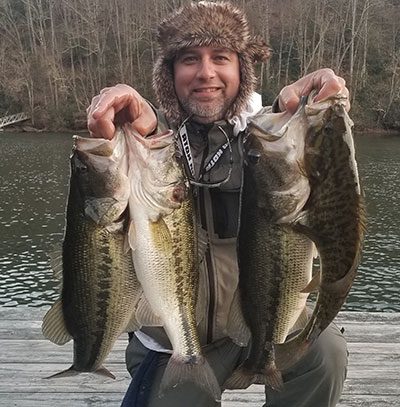Water temperatures are starting to bottom out and you need a plan. When water temperatures are dropping, bass will follow where the warmest water will be. You will find most bass in the main lake points, or somewhere nearby, on features where they can draw warmth from the sun. Look for hard structures and covers like wood and rock. You will find that most of the time you will have a bite window for only a few hours, so a plan to locate bass is very important. Starting on the sunning side of the lake will place you where they like to be when they are warming up. If you find that the bite is starting to taper off move to the other side of the lake when the sun starts hitting that shoreline. To catch them after that you will have to catch them deep, so that means you need to know how to read a graph.
When fishing deep I look for saddles, humps, and bluffs. To continue to catch bass throughout the day means you need to adapt your strategy to follow bass where they are. When the water temperatures starts to get into the lower 40’s you will notice a large die out of the shad population. You will find on your graph huge pods of shad in certain areas down deep, and they will be grouped up around underwater springs to stay alive. Using baits that act like a dying shad will turn on those winter bass. The most popular baits to use will be a blade bait, tail spinner, under spin, jerk bait, lipless crank bait, jig, and drop shot with a fluke.
If the bite is nonexistent then you will want to put down those conventional sized baits and up size your lure for more drawing power. This is also that time of year when you can catch the biggest catch of your life. Large bass still have to feed but they are not willing to burn calories to catch a meal. Dragging a large swim bait is your best bet at that point. The speed at which you have to drag your bait is much slower than you think. You have to use a swim bait with a vortex tail instead of a paddle tail because a paddle tail is too aggressive and unnatural looking for that situation.
If you live in the mountains you can always go with the elevation game. Moving to lower elevations will give you a water temperature advantage. If the water is a degree or two higher, you’re still better off than going with colder water, so keep that in mind.
Hope this helps out and have fun learning new things.
Scott Norton is a Western North Carolina native. Born in Asheville, N.C., he is a long-time hunter, angler and weekend warrior.
